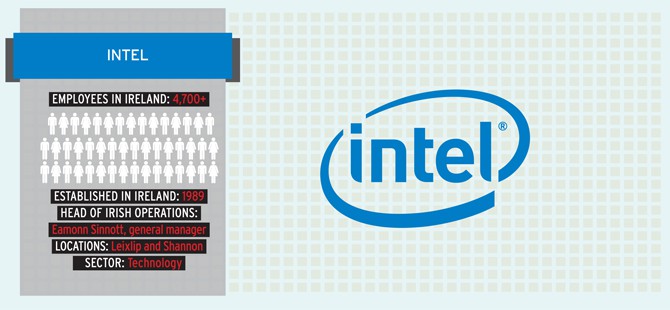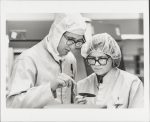A dip in the chip giant’s revenue last quarter shows the challenges the smartphone revolution is posing to the PC industry.
Intel’s now 23-year relationship with Ireland is perhaps a model for a successful FDI marriage between company and country. Since locating its technology campus in Ireland in 1989 and beginning hardware production the following year, Intel has invested over €6bn in its 360-acre former stud farm in Leixlip, turning it into the most technologically advanced industrial location in Europe.
The campus is one of Intel’s highest-volume manufacturing sites in the world and early last year, Intel Ireland general manager, Eamonn Sinnott announced that the microchip maker was investing $500mn to upgrade some of the manufacturing facilities at the campus. There had been speculation over the past few years that Intel’s continued large presence in Ireland could be under threat due to the rising labour and construction costs but the new investment would seem to reaffirm the corporation’s commitment to the country.
The manufacturing upgrade, which has employed roughly 1,000 construction workers on-site, seems to have borne fruit already, with Intel Ireland’s parent company in the US confirming that Intel’s next generation of computer chips will be manufactured at the Leixlip site. Intel choose three sites to produce each new generation of technology that it introduces every two years and Intel chief executive Paul Otellini confirmed earlier this year that Leixlip, along with Oregon and Arizona in the US would be producing the next generation 14 nanometer microchips.
Although there has been some delay recently in the training of Irish staff in the production of the new technology, sparking fears that a U-turn may be on the cards, Intel insists that its plans to bring the new technology to Leixlip remains in place.
Given the massive infrastructural investment undertaken by Intel in Ireland, and its history of success here, one would imagine that perhaps the company is less likely than many other multinationals to view Ireland’s 12.5% corporate tax rate as vital to the long-term future of Intel’s presence here.
In an interview with Business & Finance last year however, Intel Ireland general manager Eamonn Sinnott said that he believes it is “crucial that there is no change to the corporate tax rate” and that even a 1% or 2% hike by the Government would send out the wrong message.
“I can only speculate on that answer. But if I were in Intel headquarters I would interpret that as the tax rate being adjustable. And when I was doing my calculations, my financial advisers would put a prudent number in there, something like the European average for the next decade. What multinationals crave is certainty. When you change that, then the analysis of the country changes.”
Research has continued to be as vital an aspect to Intel’s operations in Ireland as manufacturing, with the company’s research unit Intel Labs Europe opening Intel’s second European Innovation Open Lab at the Leixlip base in 2009. The facility fosters cooperation between Intel, industry and academia through joint research and innovation programs and facilitates the enhancement of innovation opportunities in Europe that can be converted into various broadly based and value-driven technology solutions.
The research being undertaken by Intel in Ireland could prove increasingly important to the company’s operations here as globally Intel is going through a period of change. In 2011, Intel had a highly-successful year generating total revenues of $54bn, a 24% increase on 2010.
Much of the revenue was re-invested in research with a $10.1bn spend on research and development. Intel has also targeted a total capital spend for 2012 by of $12.5bn.
This research spend is driven by the growth of smartphone telchnology and the increased popularity of tablets like Apple Inc’s iPad. This has placed pressure on PC sales and Intel had reported earlier this year that it felt the usual fourth-quarter bounce in PC sales was likely to be cut in half this year. In the quarter just ended, Intel’s revenue from personal computer chips fell 8%, demonstrating the challenge facing the PC industry. It is the exact kind of challenge that places like the Open Lab were made for however, and is a perfect example of why the long-term commitment of a company to a country can prove invaluable to both parties.



